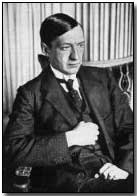Who's Who - Alexander Kerenski
 Alexander Kerenski (1881-1970)
served at the head of the Russian Provisional Government from July-October
1917; with the Bolshevik October Revolution he was forced to flee the
country, remaining in exile for the remaining 53 years of his life.
Alexander Kerenski (1881-1970)
served at the head of the Russian Provisional Government from July-October
1917; with the Bolshevik October Revolution he was forced to flee the
country, remaining in exile for the remaining 53 years of his life.
Born on 2 May 1881 in Simbirsk, Kerenski was the son of a schoolmaster. From studying law at the University of St. Petersburg Kerenski established something of a reputation for specialising in defending cases involving political offences.
A moderate socialist (and having joined the Socialist Revolutionary Party) Kerenski was elected to the state Duma in 1912. A stirring orator, Kerenski rapidly established a powerful following among industrial workers.
By the time war broke out in August 1914 Kerenski was the Duma's highest profile radical; he was one of relatively few in the Duma to oppose Russia's entrance into World War One, and he continued thereafter as a persistent opponent of the tsarist regime, frequently criticising the government's prosecution of the war.
With illness obliging Kerenski to adopt a lower profile in late 1915 his return to St. Petersburg during the summer of 1916 was marked by a notable increase in the ferocity of his complaints levied specifically against the Tsar. By now committed to Russia's participation in the war (as a firm opponent of German militarism) he was dismayed by the weakness of the Tsar's personal command of the Russian armies (Nicholas II having taken direct responsibility in September 1915).
Convinced that Russia's future demanded radical change, Kerenski publicly called upon the Tsar to abdicate towards the close of 1916. The February Revolution of 1917, which saw the Tsar duly abdicate, brought Kerenski two influential appointments; as vice-chairman of the Petrograd Soviet and as Minister of Justice in the Provisional Government.
The only person to hold a position within both the Petrograd Soviet and the Provisional Government, Kerenski was able to act as liaison between both, serving to further boost his public profile.
As Minister of Justice Kerenski was responsible for the institutional of numerous basic civil liberties, including freedom of speech, press, assembly and religion; universal suffrage and equal rights for women.
Handed the war ministry in May 1917 Kerenski was determined to ensure Russia's continued participation in the Allied war effort. He planned, with Alexei Brusilov, that summer's so-called Kerenski Offensive. The straw that broke the camel's back, the Kerenski Offensive finally broke the cohesion of the Russian army.
Appointed Prince Lvov's successor as Prime Minister at the height of the offensive in July, Kerenski found himself increasingly isolated between the extreme revolutionaries on the left (led by Lenin) and those on the right (apparently led by his newly-appointed Commander in Chief, Lavr Kornilov).
Kerenski's policies veered wildly, embracing first right and then left. He forced Lenin to flee the country (to Finland) following the July Days demonstration and subsequently announced a postponement of constituent assembly elections until November.
Although he introduced greater socialist representation into his cabinet from August 1917, news of the fall of Riga caused him to order Kornilov to return to the capital to restore order. Hearing however of Kornilov's alleged plans to replace the Provisional Government with a military dictatorship he dismissed Kornilov and ordered his recall.
With Kornilov refusing to heed Kerenski's recall and apparently marching on Petrograd, the latter was obliged to request assistance from Lenin in ensuring the continued survival of the Provisional Government. Lenin agreed to the uncomfortable alliance, although he only did so in viewing Kerenski's government as the lesser of two evils.
Kerenski publicly declared a socialist republic on 14 September and released radical leaders from prison. In his new cabinet, unveiled on 8 October, he assigned to the socialists a majority of seats.
Kerenski's fall was triggered by his decision on 5 November (Western calendar) to arrest the leaders of the MRC Bolshevik revolutionary committee, which succeeded only in bringing about their uprising.
Fleeing from Petrograd, Kerenski assembled a core of loyal troops to march upon the capital and so reverse the events of the October Revolution. He was forced to turn back however when confronted by revolutionary forces on 12 November.
Kerenski, then only 36 years old, spent the remainder of his long life in exile, chiefly in the U.S., where he taught at universities and wrote numerous articles. He published, in 1967, his memoirs, The Kerenski Memoirs: Russia and History's Turning Point.
He died on 11 June 1970 in New York aged 89.
Click here to read an address given by Kerenski in May 1917 warning against continuing military and civil unrest in Russia.
The Parados was the side of a trench farthest from the enemy.
- Did you know?
